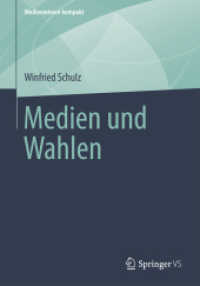- ホーム
- > 洋書
- > 英文書
- > Business / Economics
Full Description
Interest in the problems of underdeveloped economies has increased since the early 1950s, and is now a primary topic in university courses. When this book was originally published, it reflected a sense among some economists that current, orthodox economic theory is inadequate in this field.The volume includes leading American and non-American economists. The discussion of the content of courses was, in the nature of things, an extension of the discussion on the state of knowledge and reflects the period immediately prior to initial publication. Some of the issues continue to be debated, including the balance of instruction between macro- and micro-economics, the place of mathematics and econometrics, the question of the desirability of linking the study of economics with studies in administration, languages, political science, sociology or even engineering.Development economics is now an established subject in the teaching curricula of most universities. The attention of the volume is focused on the problems of creating courses of study in subjects relevant to development within some framework specially designed for the purpose. The problems of organizing such courses concerned the length of courses, the type of students to which they would cater, the qualifications and standards required for admission and successful completion of courses, and so on.The balance of instruction between macro- and micro-economics, the place of mathematics and econometrics, the question of the desirability of linking the study of economics with studies in administration, languages (in connection with area studies), political science, sociology or even engineering, the merits of methods like case studies, workshops and training in field work, are all discussed.
Contents
The Limitations of the Special Case 1; I: Papers submitted to the Conference; Part A. The State of Knowledge; Twenty Leading Questions on the Teaching of Economics; Economic Theory and the Underdeveloped Countries; What we do not know about the Economics of Development in Low Income Societies; The Use and Abuse of Models in Development Planning 1; The Economics of Educational Planning: Sense and Nonsense; Part B. Teaching Economic Development; Teaching Economic Development in the U.K.: Some Analytical Aspects; Teaching Economic Planning at the Institute of Social Studies, The Hague; Teaching Economic Development at Manchester; II: Oral discussion; Part A. The State of Knowledge; Opening Remarks; Part B. Teaching Economic Development







